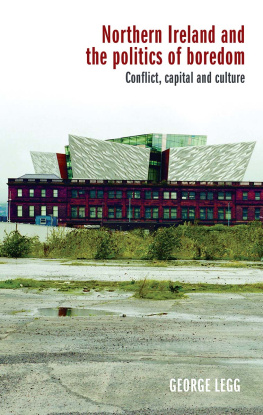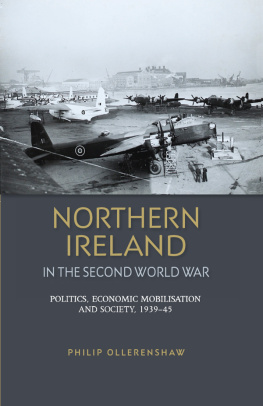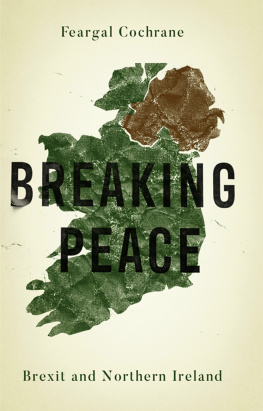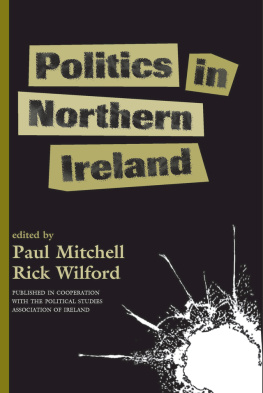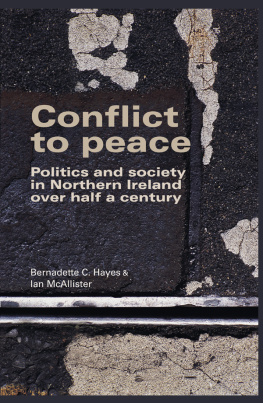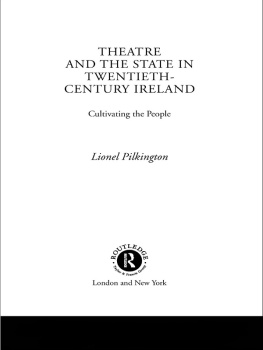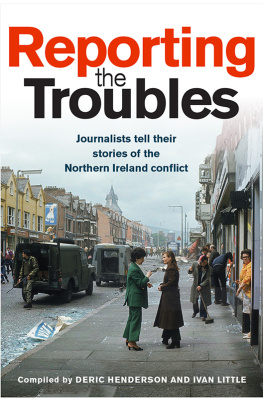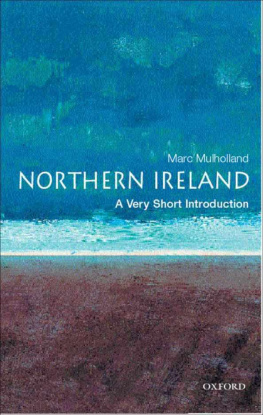Northern Ireland and the politics of boredom
Northern Ireland and the politics of boredom
Conflict, capital and culture
GEORGE LEGG
Manchester University Press
Copyright George Legg 2018
The right of George Legg to be identified as the author of this work has been asserted by him in accordance with the Copyright, Designs and Patents Act 1988.
Published by Manchester University Press
Altrincham Street, Manchester M1 7JA
www.manchesteruniversitypress.co.uk
British Library Cataloguing-in-Publication Data
A catalogue record for this book is available from the British Library
ISBN 978 1 5261 2886 7 hardback
First published 2018
The publisher has no responsibility for the persistence or accuracy of URLs for any external or third-party internet websites referred to in this book, and does not guarantee that any content on such websites is, or will remain, accurate or appropriate.
Typeset by
Servis Filmsetting Ltd, Stockport, Cheshire
For Joanna Elizabeth Campbell, with love
Contents
1 Martin Parr, Titanic Belfast. From the series Welcome to Belfast (2017). Martin Parr / Magnum Photos.
2 City Centre Approach, Road/Rail Link, Craigavon New City: Second Report on the Plan (Craigavon: Craigavon Development Commission, 1967). Craigavon Museum Services.
3 Craigavon: Local Centre, Craigavon New City: Second Report on the Plan (Craigavon: Craigavon Development Commission, 1967). Craigavon Museum Services.
4 Craigavon: City Centre Station, Craigavon New City: Second Report on the Plan (Craigavon: Craigavon Development Commission, 1967). Craigavon Museum Services.
5 Craigavon: Main Path Circuit, Craigavon New City: Second Report on the Plan (Craigavon: Craigavon Development Commission, 1967). Craigavon Museum Services.
6 Victor Sloan, City Centre (with Pony) (1982). Victor Sloan.
7 Victor Sloan, Craigavon Centre. From the series Moving Windows (1985). Victor Sloan.
8 Victor Sloan, Road, Rathmore, Craigavon. From the series Craigavon (1985). Victor Sloan.
9 Victor Sloan, Moyraverty Community Centre, Craigavon II. From the series Vietnamese Boat People (1984) Victor Sloan.
10 Victor Sloan, Vietnamese Boat People, Burnside, Craigavon. From the series Vietnamese Boat People (1984). Victor Sloan.
11 John Duncan, Shore Road. From the series Bonfires (2008). John Duncan.
12 Paul Seawright, Friday 25th May 1973. From the series Sectarian Murder (1988). Paul Seawright.
13 Paul Seawright, Friday 22nd September 1972. From the series Sectarian Murder (1988). Paul Seawright.
14 Willie Doherty, God Has Not Failed Us (The Fountain, Derry). From the series The Fountain Derry (1990). Willie Doherty.
15 Willie Doherty, The Blue Skies of Ulster (1986). Willie Doherty.
16 Willie Doherty, Native Disorders I (1991). Willie Doherty.
17 Willie Doherty, Border Incident (1994). Willie Doherty.
18 John Duncan, King George V Playing Fields. From the series Bonfires (2008). John Duncan.
This book is based on research I undertook in the Department of English at Kings College London, where I was warmly supported by colleagues. I owe an incalculable debt to Richard Kirkland for his support, advice and insight throughout the writing process. His belief in imaginative research and high scholarly standards has encouraged me to push the boundaries of our discipline. Colin Graham and Alan Read both read an earlier draft of this book and their comments have been invaluable in reconceptualising and rethinking much of this project. John Duncan, Jane Elliott, Paul Gilroy, Pat Palmer and Patrick Wright all read individual chapters and I would like to thank them for their astute observations and assistance.
I am indebted to the following for their help and enthusiasm: Tony Canavan, Garret Carr, Clara Jones, Dominic Johnson, Declan Long, Brian Murray, Caroline Magennis, Mark Turner, Maggie Scull and Victor Sloan. I am also grateful to the staff of the Liberal Arts Department at Kings who have encouraged me in the completion of this project. Victoria Baines provided invaluable assistance and intellectual insight when bringing the book to publication. For his friendship, motivation and good humour throughout the writing of this book, I am extremely grateful to Carl Kears.
My family has continually supported my research and I am thankful to my mother for her engagement with this project across all its various stages. My father has offered an excellent sounding board for my thinking and my sisters have provided welcome relief from the writing. Over the years I have also been sustained by my future family-in-law. I would like to thank Ian and Shiennah for their hospitality, and for creating a home away from home.
Finally, and most especially, I am grateful for the companionship and commitment of Joanna Elizabeth Campbell. Her positive outlook has inspired me in my thinking, while her dedication and love have sustained me in my work. Thank you Jo, for listening to me and for travelling with me. This book is dedicated to you.
I am grateful to the following for their kind permission to reproduce copyrighted material:
Ciaran Carson (c/o The Gallery Press), Seamus Deane (c/o Irish Academic Press), Willie Doherty (c/o Matts Gallery), John Duncan, Derek Mahon (c/o The Gallery Press), Martin Parr (c/o Magnum Photos), Paul Seawright, Victor Sloan and the Craigavon Museum.
Boredom is not simple.
(Roland Barthes, The Pleasure of the Text)
To approach Titanic Belfast one of Northern Irelands largest visitor attractions is to behold something of a spectacle. An angulated structure, situated in the slipways where the Titanic was born, this building is at once a beacon for Northern Irelands post-conflict regeneration and an architecture in search of global-landmark status.
It is at this intersection between capitalism and sectarianism that an affective condition begins to emerge, which I term a politics of boredom. This is not In the case of Titanic Belfast, such meaning withdrawal is particularly profound. Here, not only are Northern Irelands sectarian realities disguised by capitalisms technologies of allure but, in its attractive veneer, Titanic Belfast also ensures those forgotten historical divisions will struggle to return. The politics of boredom stems from this double movement: the withdrawal of meaning on the one hand, and the apparent inability to restore it on the other. The combined effect is to create an almost irrecoverable absence and, beholden to this process, visitors to the site are left increasingly ignorant of the divisive meanings it once signified. In this uncomfortable sense, the politics of boredom is an experience of disempowerment to which we are all vulnerable.
Boredom has not always been viewed in such broad terms. In nineteenth-century Europe, for example, boredom was held to be a privileged condition. In this period it was, as Elizabeth Goodstein has argued, a characteristic that functioned both to distinguish the rising classes from the masses and to establish the propriety of their social and material successes.
However, to examine boredoms politicisation against the backdrop of the social and political violence endemic in Northern Ireland is also to witness the more protracted reverberations of this transformation. Set against the atavisms of ethnicnational division, boredoms relationship with political economy In Northern Ireland this did not begin with an entity like Titanic Belfast or, indeed, with the Peace Process of which that building is a putative symbol. None the less, as I will demonstrate, Northern Irelands post-conflictual condition has put into sharp focus boredoms politicisation, in ways that reverberate far beyond this context. It is a period that demands an urgent investigation.


